Search Thermo Fisher Scientific
Invitrogen
CD304 (Neuropilin-1) Recombinant Rabbit Monoclonal Antibody (ST05-30)
FIGURE: 1 / 9
CD304 (Neuropilin-1) Antibody (MA5-32179) in ICC/IF
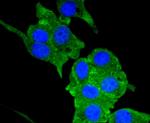
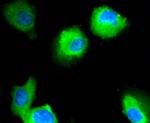
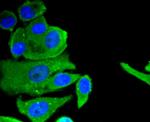
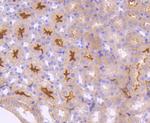
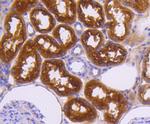
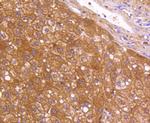
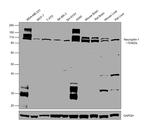
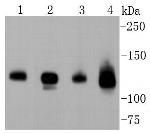
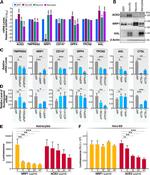
Product Details
MA5-32179
Species Reactivity
Published species
Host/Isotype
Expression System
Class
Type
Clone
Immunogen
Conjugate
Form
Concentration
Purification
Storage buffer
Contains
Storage conditions
Shipping conditions
RRID
Product Specific Information
Recombinant rabbit monoclonal antibodies are produced using in vitro expression systems. The expression systems are developed by cloning in the specific antibody DNA sequences from immunoreactive rabbits. Then, individual clones are screened to select the best candidates for production. The advantages of using recombinant rabbit monoclonal antibodies include: better specificity and sensitivity, lot-to-lot consistency, animal origin-free formulations, and broader immunoreactivity to diverse targets due to larger rabbit immune repertoire.
Target Information
Neuropilin 1 is a 923 amino acid containing membrane bound coreceptor to a tyrosine kinase receptor belonging to the neuropilin family with two CUB domains, two F5/8 type C domains and a MAM domain. Neuropilin 1 forms a heterodimer with NRP2 (Neuropilin 2) and is known to bind to plexin (PLXNB1) to form semaphorin receptors. Expressed mostly in the nervous system this receptor is implicated in a wide range of functions including in the development of the cardiovascular system, angiogenesis, repulsive axon guidance, formation of certain neuronal circuits, cell survival, control of neuronal migration and organogenesis outside the nervous system. This semaphorin receptor functions as receptors for both the semaphorins and vascular endothelial growth factor and is also a regulator of VEGF-induced angiogenesis. Neuropilin 1 may be involved in aggressive advanced prostate carcinoma and in the progression of breast cancer.
For Research Use Only. Not for use in diagnostic procedures. Not for resale without express authorization.
Bioinformatics
Protein Aliases: A5 protein; CD304; Neuropilin; Neuropilin-1; Neuropilin-1 precursor (A5 protein); Neuropilin1; NRP 1; sNRP 1; sNRP1; soluble NRP 1; soluble NRP1; transmembrane receptor; Vascular endothelial cell growth factor 165 receptor
Gene Aliases: BDCA4; C530029I03; CD304; NP-1; NP1; NPN-1; Npn1; NRP; NRP1; VEGF165R
UniProt ID: (Human) O14786, (Rat) Q9QWJ9, (Mouse) P97333
Entrez Gene ID: (Human) 8829, (Rat) 246331, (Mouse) 18186

Performance Guarantee
If an Invitrogen™ antibody doesn't perform as described on our website or datasheet,we'll replace the product at no cost to you, or provide you with a credit for a future purchase.*
Learn more
We're here to help
Get expert recommendations for common problems or connect directly with an on staff expert for technical assistance related to applications, equipment and general product use.
Contact tech support
